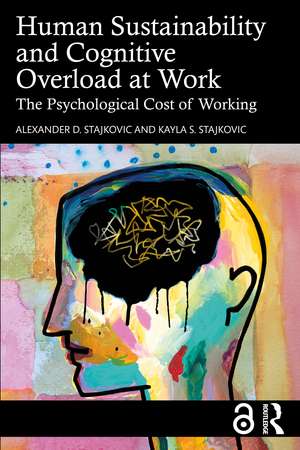Human Sustainability and Cognitive Overload at Work: The Psychological Cost of Working
Autor Alexander D. Stajkovic, Kayla S. Stajkovicen Limba Engleză Paperback – 6 aug 2024
Employee attentional processing capacity is maxed out, and psychological distress is at an all-time high. Alexander D. Stajkovic and Kayla S. Stajkovic explain how human cognitive ‘broadband’ is at the hunter-gatherer level and changes at an evolutionary snail’s pace. Yet the amount of information necessary to make a living now is incomparable to then, and the current relationship between workers and organizations is unsustainable. The authors discuss causes, processes, and consequences of human unsustainability at work, as well as suggesting remedies for personal change, leadership practice, and policy development. They frame efforts toward furthering human sustainability as a grand challenge that tackles a chronic problem at a societal level with consequences that have ripple effects into other spheres of life. Drawing from multiple disciplines and data sources, the book offers a theory-driven, evidence-based, and meaningful way to better understanding employee cognitive overload and psychological distress in organizations across the globe, and improve work lives going forward.
Human Sustainability and Cognitive Overload at Work is a useful resource for students and scholars of business, management, leadership, organizational and work psychology, and organizational studies. The practical insights will also help managers, policy makers, policy analysists, consultants, and all those with an interest in the psychological cost of working.
The Open Access version of this book, available at www.taylorfrancis.com, has been made available under a Creative Commons Attribution-Non Commercial-No Derivatives (CC-BY-NC-ND) 4.0 license.
| Toate formatele și edițiile | Preț | Express |
|---|---|---|
| Paperback (1) | 354.54 lei 3-5 săpt. | +15.01 lei 7-13 zile |
| Taylor & Francis – 6 aug 2024 | 354.54 lei 3-5 săpt. | +15.01 lei 7-13 zile |
| Hardback (1) | 944.56 lei 6-8 săpt. | |
| Taylor & Francis – 6 aug 2024 | 944.56 lei 6-8 săpt. |
Preț: 354.54 lei
Nou
Puncte Express: 532
Preț estimativ în valută:
67.84€ • 73.92$ • 57.17£
67.84€ • 73.92$ • 57.17£
Carte disponibilă
Livrare economică 02-16 aprilie
Livrare express 19-25 martie pentru 24.100 lei
Preluare comenzi: 021 569.72.76
Specificații
ISBN-13: 9781032505671
ISBN-10: 1032505672
Pagini: 181
Ilustrații: 14
Dimensiuni: 152 x 229 x 14 mm
Greutate: 0.25 kg
Ediția:1
Editura: Taylor & Francis
Colecția Routledge
Locul publicării:Oxford, United Kingdom
ISBN-10: 1032505672
Pagini: 181
Ilustrații: 14
Dimensiuni: 152 x 229 x 14 mm
Greutate: 0.25 kg
Ediția:1
Editura: Taylor & Francis
Colecția Routledge
Locul publicării:Oxford, United Kingdom
Public țintă
Academic, Postgraduate, Professional Practice & Development, and Undergraduate AdvancedCuprins
1. Introduction to Cognitive Load, Attentional Processing, and Human Sustainability at Work
Part I: How We Arrived at Cognitive Overload
2. Increase in Cognitive Load Through Epochal Stages of Human Development
3. The Failure of Leadership “Cottage Industry” and Organizational Leaders
as More Proximal Factors Contributing to Employee Cognitive Overload
Part II: How Bad is It and How Should We Work Then?
4. Evidence of Psychological Cost of Working in Contemporary Organizations: Anxiety, Depression, Work-Home Conflict, and Suicides Attributed to Work
5. Theory Guidance Toward Human Sustainability: Moral Matrices, Business
Concerns, Science, or all of the Above?
Part III: Toward Reducing Cognitive Overload and Fostering: Human Sustainability at Different Levels of Analysis
6. Modify the System: Pros and Cons of Liberal, Coordinated, and Directed
Capitalism
7. Modify Organizational Leadership: Ethics of Care and Female Leadership
Advantage
8. Modify Humans: Are There Limits to Transcending our Limitations, is Homo Sapiens Outdated, and How to Contemplate AI Upgrades?
9. Cognitive Automation: Reducing Cognitive Overload and Boosting Performance Without Attention
Part IV: Epilogue
10. Alternative Explanations, Future Research, and Conclusion
Part I: How We Arrived at Cognitive Overload
2. Increase in Cognitive Load Through Epochal Stages of Human Development
3. The Failure of Leadership “Cottage Industry” and Organizational Leaders
as More Proximal Factors Contributing to Employee Cognitive Overload
Part II: How Bad is It and How Should We Work Then?
4. Evidence of Psychological Cost of Working in Contemporary Organizations: Anxiety, Depression, Work-Home Conflict, and Suicides Attributed to Work
5. Theory Guidance Toward Human Sustainability: Moral Matrices, Business
Concerns, Science, or all of the Above?
Part III: Toward Reducing Cognitive Overload and Fostering: Human Sustainability at Different Levels of Analysis
6. Modify the System: Pros and Cons of Liberal, Coordinated, and Directed
Capitalism
7. Modify Organizational Leadership: Ethics of Care and Female Leadership
Advantage
8. Modify Humans: Are There Limits to Transcending our Limitations, is Homo Sapiens Outdated, and How to Contemplate AI Upgrades?
9. Cognitive Automation: Reducing Cognitive Overload and Boosting Performance Without Attention
Part IV: Epilogue
10. Alternative Explanations, Future Research, and Conclusion
Notă biografică
Alexander D. Stajkovic is the Dean’s Professor in Business at the Wisconsin School of Business at the University of Wisconsin – Madison, USA.
Kayla S. Stajkovic is a Lecturer at the Graduate School of Management at the University of California, Davis, USA.
Kayla S. Stajkovic is a Lecturer at the Graduate School of Management at the University of California, Davis, USA.
Descriere
This innovative book considers the cost of cognitive overload and psychological distress on human sustainability, and suggests ways to prevent employees from becoming a psychologically depleted workforce.
